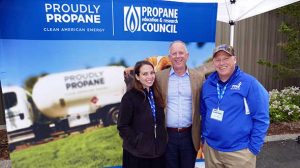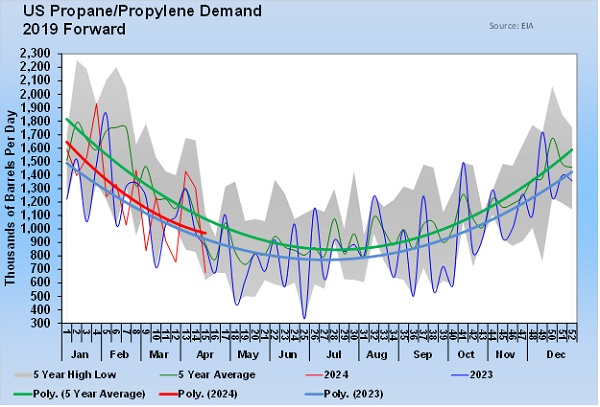In the Know: PERC

Tucker Perkins, center, is PERC’s new president and CEO. Photo by Roger Rosenbaum/Brand-News-Team Inc.
In the Know is a monthly partnership between LP Gas magazine and Propane Resources. Our focus this month is on the Propane Education & Research Council, addressed by managing partner Marty Lerum.
Q: The Propane Education & Research Council (PERC) recently appointed Tucker Perkins as its new president and CEO. What issues or initiatives would you like to see addressed by PERC’s new president and executive committee?
A: At Propane Resources, we get a chance to talk to a lot of independent retail propane companies across the United States that have employees who serve on three state PERC boards.
Tucker Perkins comes into the CEO position having worked in the field as a propane retailer, as well as within the PERC infrastructure.
The retail propane industry is in a transformational era. When former PERC president and CEO Roy Willis started with the council nearly 20 years ago, the U.S. propane industry had to import propane to balance supply with demand. That held the price of propane around 70 percent of crude oil.
The propane industry couldn’t take on larger demand loads without causing propane prices to increase and become uncompetitive. The United States has become the largest propane exporter in the world, and we will likely see the price of propane around 50 percent of crude oil in the future.
Propane now has price-competitive advantages against electricity, fuel oil and even natural gas in some markets. PERC needs to help transition the retail propane industry from an operating environment to one of marketing through education. Educate legislators, HVAC companies, builders, school kids and propane retailers on the green benefits and value proposition of propane.
From the propane retailer perspective, there are several propane industry issues and programs the new leader of PERC should address:
■ Increase access to PERC, which is not easy in Washington, D.C. Moreover, instead of PERC directing dollars toward staffing the council in Washington, perhaps it should consider a lower-cost headquarter city and direct any savings toward residential propane growth programs.
■ Overcome energy competitors. Natural gas and electric utilities are trying to encroach on the retail propane industry by passing legislation at state levels that takes away a level playing field.
■ Find additional ways to assist the retail propane industry in moving from an operating mindset to one focused on marketing, especially now that the United States is the world’s largest producer of propane.
■ Reconsider “Blue the Dog” as the industry’s primary marketing strategy. PERC took steps at its last meeting to adapt this strategy and focus on a national consumer appliance rebate program in 2018.
■ Direct and leverage funds to fewer programs to get more meaningful results. We looked at 78 dockets, which are research and development programs funded by PERC, during the 2010-16 time frame. The budget for these programs totaled $38.5 million, with $31.2 million being spent. The majority (57 percent) was spent on autogas-related programs, followed by 29 percent on generator/forklift/heat pump/flaming programs. Environmental programs received 5 percent of the funds. Other programs and propane challenge funding each received 4 percent. PERC should find a way to make the autogas program more meaningful to the average propane retailer.
Propane retailers also have several propane markets and gallon-growth opportunities they feel the new leader of PERC should address:
■ Fund expertise that will help all retail propane companies grow autogas gallons in their respective markets.
■ Develop programs to exploit the fact that propane is cheaper than electricity.
■ Educate and incentivize HVAC companies to partner with their local propane retailers in order to educate consumers on propane’s cost and environmental advantages.
■ Educate propane retailers on all of the positive aspects of the United States being the largest producer of propane and why propane exports are no different than petrochemicals in helping to balance propane production and demand. Help retailers understand how exports help the retail propane industry develop new customers in the long term.
Marty Lerum is managing partner of Propane Resources. He can be reached at marty@propaneresources.com or by calling 913-262-8531.
















